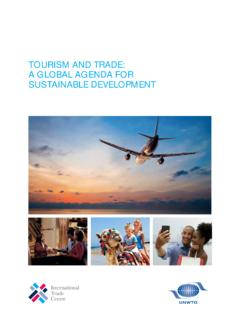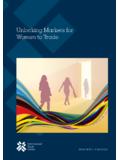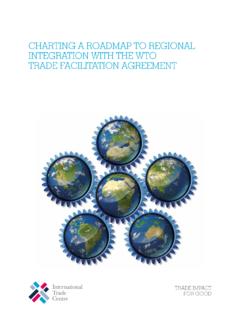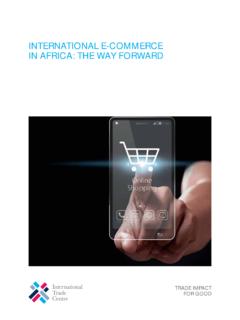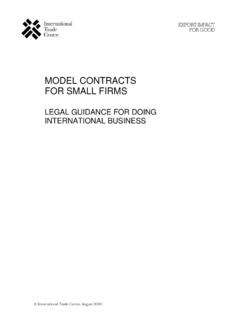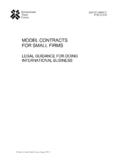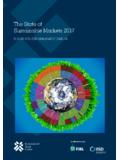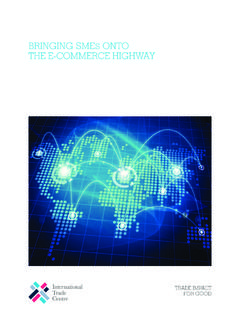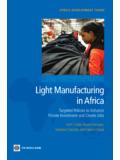Transcription of WTO TRADE FACILITATION AGREEMENT - …
1 P: +41 22 730 0111F: +41 22 733 4439E: addressInternational Tr ade CentrePalais des Nations1211 Geneva 10, SwitzerlandStreet addressInternational Tr ade Centre54-56 Rue de Montbrillant1202 Geneva, SwitzerlandP: +41 22 730 0111F: +41 22 733 4439E: addressInternational Tr ade CentrePalais des Nations1211 Geneva 10, SwitzerlandStreet addressInternational Tr ade Centre54-56 Rue de Montbrillant1202 Geneva, SwitzerlandP: +41 22 730 0111F: +41 22 733 4439E: addressInternational Tr ade CentrePalais des Nations1211 Geneva 10, SwitzerlandStreet addressInternational Tr ade Centre54-56 Rue de Montbrillant1202 Geneva, SwitzerlandThe International TRADE Centre (ITC) is the joint agency of the world TRADE Organization and the United TRADE FACILITATION AGREEMENTA BUSINESS GUIDE FOR DEVELOPING COUNTRIESWTO TRADE FACILITATION AGREEMENT A BUSINESS GUIDE FOR DEVELOPING COUNTRIES WTO TRADE FACILITATION AGREEMENT : A BUSINESS GUIDE FOR DEVELOPING COUNTRIES ii Abstract for TRADE information services ID=43065 2013 WTO International TRADE Centre (ITC) WTO TRADE FACILITATION AGREEMENT : A Business Guide for Developing Countries Geneva: ITC, 2013.
2 Xi, 30 pages (Technical paper) Doc. No. The guide explaining the significance of the WTO AGREEMENT on TRADE FACILITATION and the reasons why it was proposed aims at helping business communities in developing countries understand the obligations that these countries have taken on or will do so in the future; gives an overview of the main provisions of the AGREEMENT ; explains how it is intended to ease border controls for business, and how business can still influence the way that governments implement the obligations and specific commitments they have undertaken in reaching the AGREEMENT ; includes bibliographical references (pp. 29-30). Descriptors: TRADE FACILITATION , WTO, SMEs, Developing Countries For further information on this technical paper, contact Mr. Rajesh Aggarwal English The International TRADE Centre (ITC) is the joint agency of the world TRADE Organization and the United Nations.
3 ITC, Palais des Nations, 1211 Geneva 10, Switzerland ( ) Views expressed in this paper are those of consultants and do not necessarily coincide with those of ITC, UN or WTO. The designations employed and the presentation of material in this paper do not imply the expression of any opinion whatsoever on the part of the International TRADE Centre concerning the legal status of any country, territory, city or area or of its authorities, or concerning the delimitation of its frontiers or boundaries. Mention of firms, products and product brands does not imply the endorsement of ITC. This technical paper has not been formally edited by the International TRADE Centre. Digital image on the cover: Schutterstock, Erwyn van der Meer and ITC International TRADE Centre 2013 ITC encourages the reprinting and translation of its publications to achieve wider dissemination.
4 Short extracts of this technical paper may be freely reproduced, with due acknowledgement of the source. Permission should be requested for more extensive reproduction or translation. A copy of the reprinted or translated material should be sent to ITC. WTO TRADE FACILITATION AGREEMENT : A BUSINESS GUIDE FOR DEVELOPING COUNTRIES iii Foreword One of the main outcomes of the world TRADE Organization s 9th Ministerial Conference in Bali, Indonesia, in December 2013 has been an AGREEMENT on TRADE FACILITATION . TRADE FACILITATION is important because it can have a major impact on bringing down TRADE transaction costs. It essentially concerns the cost of clearing goods for import and export. Despite the huge attention given to the cost of border controls over the last 10-15 years, goods continue to be delayed at the border for days (or even weeks), slowing TRADE flows and adding costs to business that are often passed on to consumers.
5 TRADE transaction costs are highest in developing countries, which are the least able to carry this additional burden. Several elements of poor connectivity affect least developed countries (LDCs): many are remotely located, land-locked, or are small island states; transport infrastructure is often poor. As a result, the average cost of trading is higher in LDCs (for instance, 43% more to move a container across the border) than in other developing countries. These costs affect small and medium-sized enterprises (SMEs) disproportionately. They often lack the means and capacity to comply with complex rules, and the high costs of compliance with customs and border procedures and other non-tariff measures (NTMs) represent significant charges in relation to their smaller volumes of TRADE .
6 This makes them uncompetitive as suppliers and hampers their integration into regional and global value chains. The TRADE FACILITATION AGREEMENT , which will be binding on all 159 WTO Member States at the level of all border agencies, and not just customs authorities, has been described as a classic 'win-win' outcome. But because there are implementation concerns among some developing countries, and especially LDCs, the AGREEMENT includes some flexibilities, including provision for technical assistance for its implementation. To ensure that business, particularly businesses in developing countries, can benefit, it is important that business understands what the AGREEMENT provides for and how the implementation process can be influenced.
7 This simple guide aims at explaining why the AGREEMENT has been proposed, what the main provisions of the AGREEMENT are, how it is intended to ease border controls for business, and how business can ensure its voice is heard in the way that governments implement the obligations and specific commitments they have undertaken in reaching the AGREEMENT . This guide is not a guide on TRADE FACILITATION itself, on which other studies and guidance have been issued by many other organizations, notably the world Bank, the Organisation for Economic Co-operation and Development (OECD) and the United Nation s own Centre for TRADE FACILITATION and Electronic Commerce (UN/CEFACT), both independently and under the joint auspices of the Global FACILITATION Partnership for Transportation and TRADE (GFP).
8 The International TRADE Centre (ITC) is ready to work with SMEs in developing countries to increase their knowledge of the new rules and the benefits available to them. It will also assist developing country governments with the preparation of print and online communication materials to inform SMEs of the new rules, under the transparency provision of the AGREEMENT . ITC will also facilitate dialogue between the public and private sectors, providing SMEs with a platform to share with government representatives the kind of information they need to enhance their export competitiveness, and to provide a feedback mechanism on the implementation of the new rules on the ground. Arancha Gonz lez Executive Director International TRADE Centre WTO TRADE FACILITATION AGREEMENT : A BUSINESS GUIDE FOR DEVELOPING COUNTRIES iv WTO TRADE FACILITATION AGREEMENT : A BUSINESS GUIDE FOR DEVELOPING COUNTRIES v Acknowledgements Malcolm McKinnon, former Head of TRADE in Services at the United Kingdom s Department for TRADE and Industry, and former Chief Executive of SITPRO Ltd, the United Kingdom s TRADE FACILITATION body, is the author of this guide.
9 He has based it on his six years as Chief Executive of SITPRO, as well as 11 years as the United Kingdom s leading TRADE official on TRADE in services (1994-2005). Malcolm has travelled extensively, especially in sub-Saharan Africa, where he has seen at first hand the problems at border crossings of achieving efficient border management. Together with his predecessor and the Commonwealth Business Council, he also facilitated the Boksburg Group, an informal group of developing country TRADE and customs officials and private sector representatives, who met in their personal capacities and helped to influence the early thinking about the potential scope of a WTO TRADE FACILITATION AGREEMENT . This book has involved consultation with other experts in the field of TRADE FACILITATION .
10 The author is particularly indebted to Nora Neufeld at the WTO Secretariat, who has given valuable advice over the years during the development of the TRADE FACILITATION text, as well as former colleagues at SITPRO, particularly Shondeep Banerji and Graham Bartlett, who kindly read through the script and offered comments for improvement. Rajesh Aggarwal, Chief, Business and TRADE Policy Section, supervised the writing of the paper, with Jean S bastien Roure, Senior Officer, and Charlotta Falenius, Associate Expert, Business and TRADE Policy Section, ITC. WTO TRADE FACILITATION AGREEMENT : A BUSINESS GUIDE FOR DEVELOPING COUNTRIES vi WTO TRADE FACILITATION AGREEMENT : A BUSINESS GUIDE FOR DEVELOPING COUNTRIES vii Contents Foreword iii Acknowledgements v Abbreviations ix Executive summary xi Chapter 1 Negotiating history 1 WTO members have wanted an AGREEMENT for 20 years 1 The costs and benefits of TRADE FACILITATION 1 TRADE FACILITATION became a Singapore issue 3 Member States included TRADE FACILITATION in the July 2004 package 4 Developing countries worried about implementation costs 4 Chapter 2 Why the existing GATT was not enough 6 Articles V, VIII and X 6 Freedom of transit (Article V) 6 Fees and formalities (Article VIII) 7 Transparency (Article X) 7 Identifying business needs 7 Chapter 3 The new WTO AGREEMENT on TRADE FACILITATION 9 The overall shape of the AGREEMENT 9 The specific issues that have been agreed 9 Article 1.
